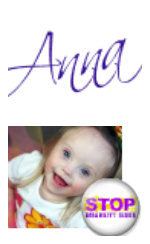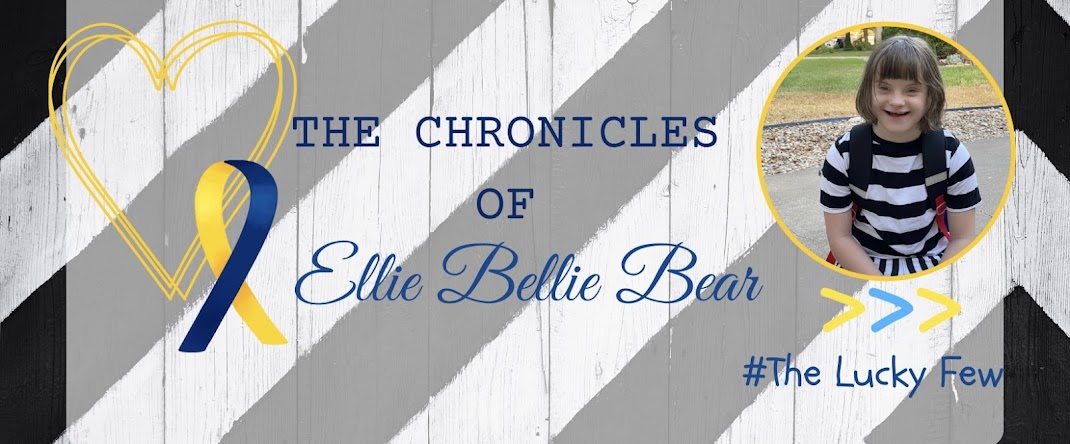 |
| I love. I am loved. I am good. I am valued. I have worth. I have Down syndrome. |
In light of the new, earlier prenatal blood test for Down syndrome these three studies were not published a moment too soon. (please refer to Defective: Designer Genes and Designer Babies) I have taken the liberty of summarizing each of them for you so that you do not need to sift through the mambo jambo of Likert scales and statistical significance.
The American Journal of Medical Genetics released the results of 3 studies (cross-cultural qualitative and quantitative studies across six states in various regions of the Unites States).
 |
| I improve and strengthen marriages. I am love and make my parents proud. |
Mother & Father Perceptions on Raising a Child with Ds
- Most parents express their love and pride for their child with Ds' accomplishments
- Parents report that they are more tolerant, patient, accepting, kind, appreciative, and empathetic
- Parents report that their other children (the siblings) are more caring and sensitive
- Parents report a positive change in their attitudes towards life and what is really important in life
- Laughter, joy, and celebration are a huge part of their family experience
- Parents possess new found acceptance and respect for people
- Parents are LESS likely to get divorced than their counterparts who do NOT have a child with Ds (also documented in 2007 by Urbano and Hodapp)
- Only a measly 11% reported increased marital discord due to Ds
- Only 4 % express regret in having the child. Of that 4%, the majority had older children with Ds. It is hypothesized in the study that the regret could be due to the lack of social, education, and supportive services back then.
- About 50% of parents found help and support from their local Ds Associations
 |
| I teach acceptance and patience. I am love and joy. |
Sibling Perceptions of Having a Brother or Sister with Ds
- Majority of sibling of all ages expressed profound love and pride for their brother or sister with Ds.
- Most of the sibling believed that they are better people because of their brother or sister with Ds.
- As the participants matured into the teenage years, they reported feeling better able to identify themselves specifically because their sibling has Ds in that they have learned important life lessons.
- They report feeling that they have a deeper appreciation of all people.
- Most siblings are very comfortable with their brother or sister with Ds while only a few are said to be embarrassed in public.
- Many siblings enjoy helping their brother or sister with Ds learn new things & achieve new tasks.
- A small minority of siblings expressed feeling sorry for the sibling with Ds-especially those who had complex health issues.
- A minority of siblings report feeling as though their parents gave them more choirs or responsibilities than the sibling with Ds. Yet the majority felt comfortable with increased responsibilities and intend to stay involved in their siblings life as they both age.
- A minority of sibling report that they did not get enough or disproportionate amount of attention from their parents. That was mostly seen among those who were older than the sibling with Ds and those who were not yet in their teenage years.
 |
| I contribute to society. I am valuable. I am worthy.. I am LIFE. |
Self-Perceptions on Having Ds (participates are 12+ years-old with Ds, mean age of 23.4 years)
- ". . . these finding [previous studies] suggest that with regard to the domains of academic competence, physical abilities, and social acceptance, young persons with DS have very positive views of themselves, which became even more positive with age..." (pg. 2360).
- Majority of participants states that they are happy with their lives, their appearance, and who they are (WOW! How many of you are happy with all of those aspects?)
- Their functional skills are NOT related to the participant's happiness or sense of fulfillment.
- They report that they love their family including siblings.
- In response to what they want health care providers to know:
- They have good lives and are proud of who they are.
- They ask to be valued: "do not label us. People with DS do lots of things."; "I would like parents to value a person with Ds"
- They have hopes and dreams: getting married, living in an apartment, playing sports.
- Other participants talked about their close friendships.
- A few wanted to "get rid of the extra chromosome" and states that they did not like Down syndrome.
- In response on what to tell new parents:
- there will be love between the baby and the parents and that their own lives are good.
- That the baby will love them.
- Also that the parents do not need to worry.
- Responses such as "If everyone was as happy as me, that would be great"; "I am have friends who care about and love me"; "It is okay to have special needs"
- treat the child like a 'normal child'. As well as the baby might be sick a lot and need a doctor.
- Many want parents to have patience because some areas are harder for them to learn.
- Some pointed out the similarities between those who have Ds and those who are "typical".
- Some expressed feeling sad or wanting to be more like their siblings--this small percentage was seen among those just out of high school.
 |
| I am a future friend, classmate, co-worker, wife, daughter-in-law. Life is precious. |
It is my hope that health care providers use this information to provide accurate and up-to-date information about not only Down syndrome itself, but also about family dynamics when working with expectant families or with a family who has an infant that is newly diagnosed.
This is Part 1 of a 2 or 3 part series.
Part 2 will be a personal interview with my Dad who has a sister with Ds. I have not mentioned this to or cleared this with my father yet. . . Dad, would you mind helping your daughter out with a future blog post?
References:
Skotko B., Levine S., and Goldstein R. Having a Son or Daughter with Down Syndrome: Perspectives from Mothers and Fathers (2011, Oct). American Journal of Medical Genetics. vol 155, issue 10, 2335-2347
Skotko B., Levine S., and Goldstein R. Having a Brother or Sister With Down Syndrome: Perspective From Siblings (2011, Oct). American Journal of Medical Genetics. vol 155, issue 10, 2348-2359
Skotko B., Levine S., and Goldstein R. Self-Perceptions from People with Down Syndrome (2011, Oct). American Journal of Medical Genetics. vol 155, issue 10, 2360-2369



Anna, I think those who DO divorce because of DS would have been divorced anyway. Having a sick baby is a huge strain on everyone. The participants in a marriage either have it within them to become stronger because of the trials of life ( including raising children with or without DS)or they don't. I know that DS, hospital stays, and surgeries have challenged my marriage, which wasn't old or perfect to begin with. But marriages that don't make it would have broken up whether DS was in the equation or not.
ReplyDeleteThe fact that my kids don't notice anything different about Liddy is a balm to a heart that feared the opposite. To them, she isn't any different than they are and they love her simply because she is their sister. They annoy her just like they do each other and one day soon, she's going to be annoying them right back. :)
This family isn't perfect. We get on each others' nerves. We fight. We make up. Our kids get in trouble. We struggle financially sometimes. We juggle work and school and housework and appointments. But we also couldn't live without each other, and Liddy is as vital a part as any of the rest of us. It's hard to be upset when looking at that precious smile or hearing that musical laugh!
Thank you for setting the record straight, friend. :)
XOXOXO,
Heidi
Thank you for sharing! I agree with you 100%.
ReplyDeleteAnna-Do I have your permission to repost on my blog and perhaps share on FB? If not, no biggie.
ReplyDeleteOoh I am loving all of the comments! Heidi, I agree completely. In the study they do hypothesize that the divorce may have occurred anyway and not necessarily as a direct result of having a child with Ds.
ReplyDeleteElissa, repost and "set the record straight!"
She makes me smile seeing her cute pictures...every person has a purpose going to be something great!! she has taught me a lot by reading her blog and if I ever to have a child with DS I would be that much more prepared!!
ReplyDeleteEllie...and you, Anna...are simply awesome!
ReplyDelete